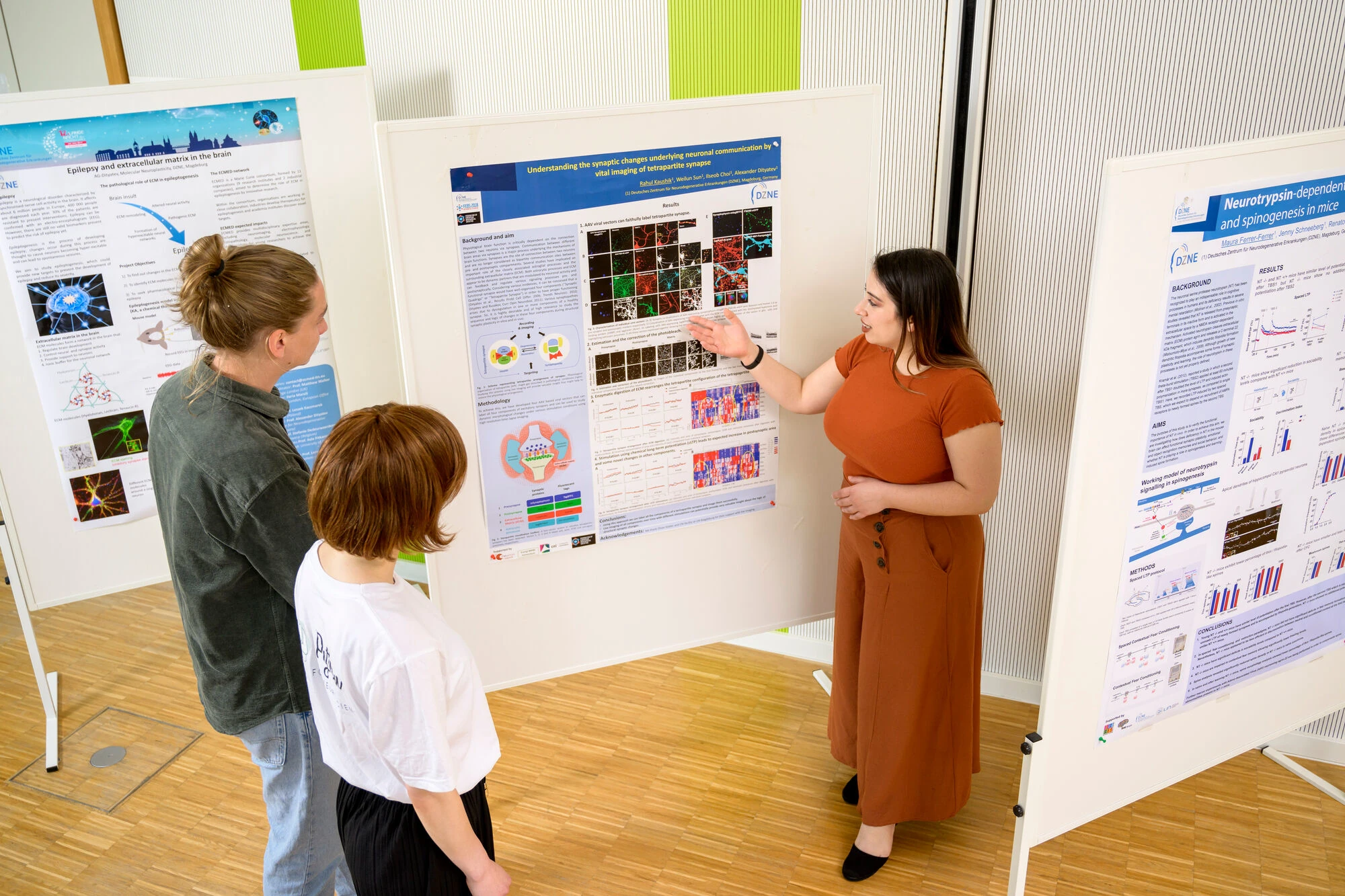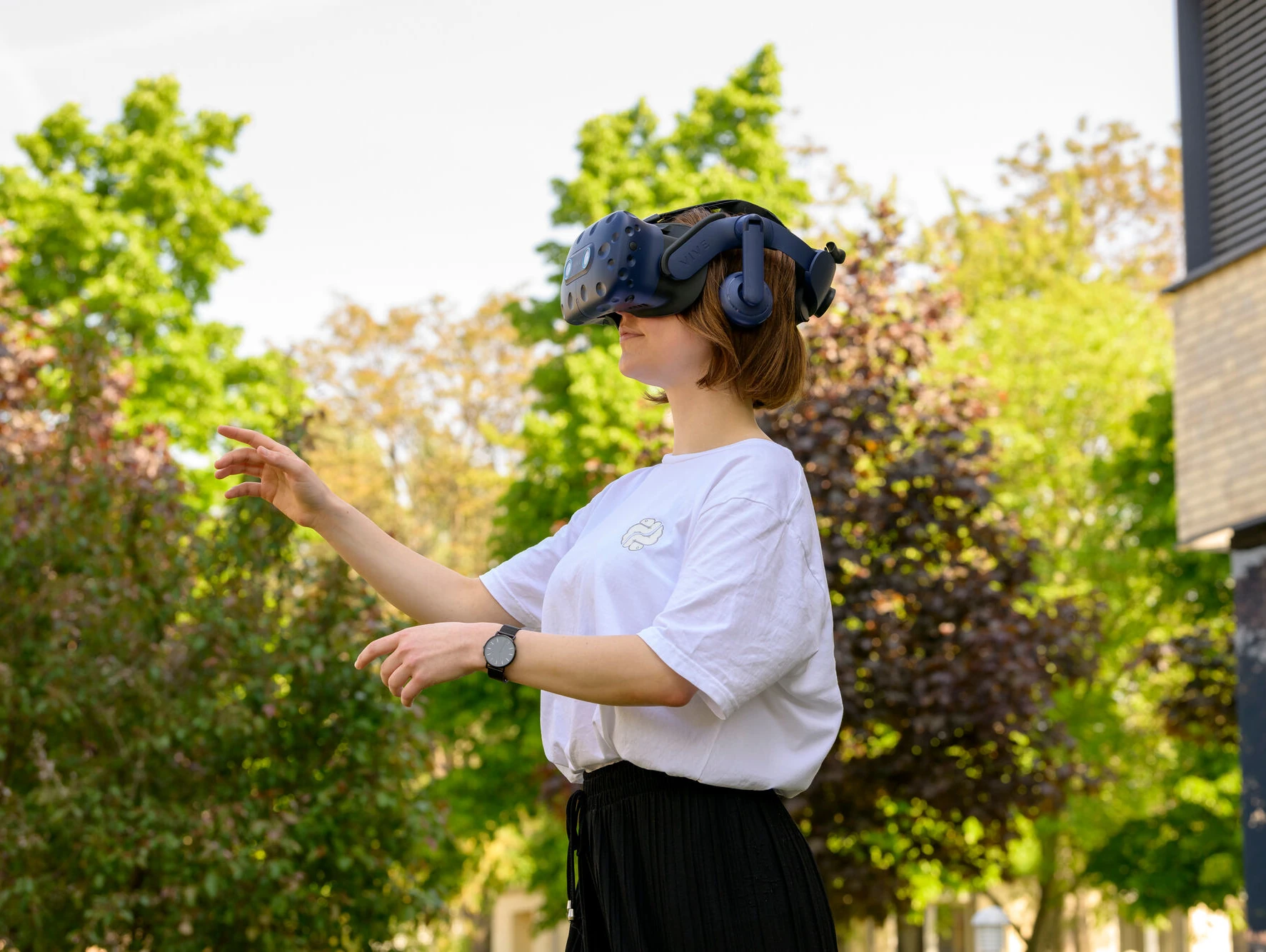
Unlocking the Full Cognitive Potential of the Brain
How can the brain’s cognitive potential be mobilized, enhanced and maintained? An interdisciplinary team from the fields of medicine, biology, biochemistry, psychology, physics, and pharmacology is investigating these questions in the DFG-funded Collaborative Research Center (CRC) 1436 “Neural Resources of Cognition”.

Professor Andrew Parker from the University of Magdeburg leads an international research…

Research Area A
What are the molecular and synaptic
foundations for cognitive enhancement?

Research Area B
How does cognitive training change
the neural circuitry of the brain?

Research Area C
Are changes in the neural networks of the brain
related to the mobilization of cognitive resources?


News from the neurosciences of the CRC
How the Brain Processes Spatial Information
Professor Andrew Parker from the University of Magdeburg leads an international research…
Focus Topic on “dasGehirn.info”: Aging Successfully
In December, the research portal dasGehirn.info visited our CRC 1436 and has…
Upcoming lectures – CRC 1436 External Speaker Series
Please save the date for our upcoming lectures: 16.02.2026 Hans Kirschner (Otto…
FAM-conference – register now
From May 20 to 22, 2026, the 7th International Functional Architecture of…
Call for publication award
The CBBS is seeking the best publication of the year 2025. CBBS…
IRTG – ANIMAL WORKSHOP
On February 24-25, 2026 the Animal Workshop – Tools and paradigms for probing…
App helps with Alzheimer’s research
“Alzheimer’s can be described as a widespread disease,” said Emrah Düzel in…
Michaela Butryn as a guest on the DZNE podcast
In the fifth episode of the DZNE podcast “90 Millarden” hosted by…
guest researcher in our CRC 1436
Andrés Jaramillo Flautero from Colombia joined our CRC as a guest researcher…
Treatment of Alzheimer’s Disease
In an exciting report by Mitteldeutscher Rundfunk (MDR), Dr. Wenzel Glanz explains…
Our research focus
Is it possible to increase the performance of memory?
What is the hidden potential of the brain and what are its limits?
How can the brain’s cognitive potential be mobilized and enhanced?
The architecture of our brain provides biological limits for the performance of memory, attention, and our capacity for learning; this is evident on both the micro and macro scale. However, there is large variability within these limits and individual cognitive abilities can be improved through directed training. The goal of our Collaborative Research Center (CRC) is to uncover the performance limits of the human brain and to explore methodological approaches for improving this performance. We aim to understand which neurobiological principles limit cognitive resources and how these resources can be fully accessed or even enhanced. Further, we will identify new ways to preserve neural resources across the lifespan with targeted interventions.
More than 40 scientists in 20 individual projects are currently working in our CRC towards this exciting neuroscientific topic, which is also highly relevant in our current society.
Using the latest neuroscientific technologies and innovative methods, human and animal experimental studies will examine individual variability and transferable improvement in cognitive function. We place a specific focus on how performance improvements in one task can be transferred to other tasks and when task performance comes at the expense of other abilities. We also ask, why do cognitive abilities decline with age? And what are the tremendous resources of “super-agers”? Further, we are investigating how molecular and biochemical processes affect cognitive performance, for instance, with the deposition of tau and amyloid in the brain, or those that occur with sleep deprivation or other environmental influences. This project is funded by the German Research Foundation (DFG) and encompasses both the Otto von Guericke University Magdeburg and the Leibniz Institute of Neurobiology, as well as the German Center for Neurodegenerative Diseases (DZNE) Magdeburg site, Freie Universität Berlin, Charitè Universitätsmedizin Berlin, and the universities of Leipzig, Heidelberg, and Göttingen.

Co-Spokesperson Prof. Dr. Michael Kreutz & Spokesperson Prof. Dr. med. Emrah Düzel
Publications of the CRC
Putamen vascularization on high-resolution 7T MRI is associated with perfusion and cognitive performance in cerebral small vessel disease
Niklas Philipp Arndt, Stefanie Boewe, Jascha Brüggemann, Berta Garcia-Garcia, Renat Yakupov, Niklas Vockert, Anne Maas, Malte Pfister, Valentina Perosa, Marwa Al Dubai, Robin Jansen, Sven G Meuth, Marc Dörner, Patrick Müller, Solveig Henneicke, Frank…
A physically and mentally active lifestyle relates to younger brain and cognitive age
Niklas Behrenbruch, Svenja Schwarck, Beate Schumann-Werner, Eóin N. Molloy, Berta Garcia-Garcia, Anne Hochkeppler, Larissa Fischer, Anna-Therese Büchel, Enise I. Incesoy, Jose Bernal, Niklas Vockert, Patrick Müller, Gusalija Behnisch, Bárbara Morgado, Hermann Esselmann, Constanze I. Seidenbecher, Björn H. Schott, Henryk Barthel, Osama Sabri, Jens Wiltfang, Michael C. Kreissl, Emrah Düzel & Anne Maass GeroScience…
Frontal theta oscillations and cognitive flexibility: Age-related modulations in EEG activity
Margarita Darna, Christopher Stolz, Hannah-Sophia Jauch, Hendrik Strumpf, Jens-Max Hopf, Constanze I. Seidenbecher, Björn H. Schott, Anni Richter Aging Brain (2025)
Immersive virtual reality for older adults: Challenges and solutions in basic research and clinical applications
Malika Schaumburg, Ashar Imtiaz, Ruojing Zhou, Matthieu Bernard, Thomas Wolbers, Vladislava Segen Ageing Res Rev (2025)
Cortical network modulations associated with prolonged training of the multiple object-tracking task
Anna-Maria Felßberg, Nadine Schönemann, Jens-Max Hopf, Mircea Ariel Schoenfeld, Christian Merkel Imaging Neuroscience (2025)
Differential effects of aging, Alzheimer’s pathology, and APOE4 on longitudinal functional connectivity and episodic memory in older adults
Larissa Fischer, Jenna N. Adams, Eóin N. Molloy, Niklas Vockert, Jennifer Tremblay-Mercier, Jordana Remz, Alexa Pichet Binette, Sylvia Villeneuve, Anne Maass & PREVENT-AD Research Group Alzheimers Res Ther (2025)
CSF biomarkers are differentially linked to brain areas high and low in noradrenaline, dopamine and serotonin across the Alzheimer’s disease spectrum
Lena Haag , Elisa Lancini , Renat Yakupov , Gabriel Ziegler , Yeo-Jin Yi , Falk Lüsebrink , Wenzel Glanz , Oliver Peters , Eike Jakob Spruth , Slawek Altenstein…
Post-movement beta rebound reflects strategic re-aiming during motor adaptation, but not re-aiming accuracy
M Will, B Korka, MP Stenner bioRxiv (2025)
Prior Knowledge Changes Initial Sensory Processing in the Human Spinal Cord
Max-Philipp Stenner, Cindy Márquez Nossa, Tino Zaehle, Elena Azañón, Hans-Jochen Heinze, Matthias Deliano, Lars Büntjen Sci Adv (2025)
Neurocan regulates axon initial segment organization and neuronal activity
Baidoe-Ansah D, Mirzapourdelavar H, Aleshin S, Schott BH, Seidenbecher C, Kaushik R, Dityatev A. Matrix Biol. (2025)
Neuronal heterogeneity in the medial septum and diagonal band of Broca: classes and continua
Felix Kuhn, Petra Mocellin, Stefano Pupe, Lihua Wang, Andrew L. Lemire, Liudmila Sosulina, Oliver Barnstedt, Nelson Spruston, Mark S. Cembrowski, Stefan Remy bioRxiv (2024)
Cognitive Reserve Against Alzheimer’s Pathology Is Linked to Brain Activity During Memory Formation (2024)
Niklas Vockert, Judith Machts, Luca Kleineidam, Aditya Nemali, Hartmut Schütze, Renat Yakupov, Oliver Peters, Daria Gref, Luisa Sophie Schneider, Lukas Preis, Josef Priller, Eike Jakob Spruth, Slawek Altenstein, Anja Schneider,…
Human hippocampal and entorhinal neurons encode the temporal structure of experience
Tacikowski, P., Kalender, G., Ciliberti, D., & Fried, I. Nature (2024)
Cerebral hyperactivation across the Alzheimer’s disease pathological cascade.
Corriveau-Lecavalier N., Adams J.N., Fischer L., Molloy E.N., Maass A. Brain Communications (2024)
Single-value brain activity scores reflect both severity and risk across the Alzheimer’s continuum
Soch J, Richter A, Kizilirmak JM, Schütze H, Ziegler G, Altenstein S, Brosseron F, Fliessbach K, Freiesleben SD, Glanz W, Gref D, Heneka MT, Incesoy EI, Kilimann I, Kimmich O,…
Orexinergic modulation of chronic jet lag-induced deficits inmouse cognitive flexibility
Julius Duske, Nicole D’Souza, Dana Mayer, Daniela C. Dieterich and Markus Fendt Neuropsychopharmacology (2024)
“Micro-offline gains” convey no benefit for motor skill learning
A Das, A Karagiorgis, J Diedrichsen, MP Stenner, E Azanon bioRxiv(2024)
Spatial mRNA expression patterns of orexin receptors in the dorsal hippocampus – Sci Rep (2024)
Krause GM, Chirich Barreira LM, Albrecht A Sci Rep (2024)
Identifying older adults at risk for dementia based on smartphone data obtained during a wayfinding task in the real world
Marquardt J, Mohan P, Spiliopoulou M, Glanz W, Butryn M, Kuehn E, Schreiber S, Maass A, Diersch N. PLOS Digit Health (2024)
Age-related differences in human cortical microstructure depend on the distance to the nearest vein
Christoph Knoll, Juliane Doehler, Alicia Northall, Stefanie Schreiber, Johanna Rotta, Hendrik Mattern, Esther Kuehn Brain Communications (2024)
Obesity is driven by a build-up of molecular mesh around hunger neurons
Alexander Dityatev Nature (2024)
Imaging body-mind crosstalk in young adults
Yu, Q., Kong, Z., Zou, L., Herold, F., Ludyga, S., Zhang, Z., Hou, M., Kramer, A. F., Erickson, K. I., Taubert, M., Hillman, C. H., Mullen, S P., Gerber, M.,…
Online stimulation of the prefrontal cortex during practice increases motor variability and modulates later cognitive transfer: a randomized, double-blinded and sham-controlled tDCS study.
Nisha Maria Prabhu, Nico Lehmann, Elisabeth Kaminski, Notger Müller & Marco Taubert Sci Rep (2024)
The P3 event-related potential increases when humans learn a strategy for motor adaptation
Bettina Korka, Max-Philipp Stenner Eur J Neurosci (2024)
Reduced expression of fMRI subsequent memory effects with increasing severity across the Alzheimer’s disease risk spectrum
Soch J, Richter A, Kizilirmak JM, Schütze H, Altenstein S, Dechent P, Fliessbach K, Glanz W, Herrera AL, Hetzer S, Incesoy EI, Kilimann I, Kimmich O, Lammerding D, Laske C,…
Astrocyte-derived factors regulate CNS myelination
Seiler S, Rudolf F, Gomes FR, Pavlovic A, Nebel J, Seidenbecher CI, Foo LC Glia (2024)
Precuneus activity during retrieval is positively associated with amyloid burden in cognitively normal older APOE4 carriers
Larissa Fischer, Eóin N. Molloy, Alexa Pichet Binette, Niklas Vockert, Jonas Marquardt, Andrea Pacha Pilar, Michael C. Kreissl, Jordana Remz, Judes Poirier, M. Natasha Rajah, Sylvia Villeneuve, PREVENT-AD Research Group, Anne Maass bioRxiv (2024)
Physical activity modulates early visual response and improves target detection in humans
Weischner, T., Che, X., Schmid, P., Reichert, C., Scholz, A., Knight, R.T., Dürschmid, S. bioRxiv (2024)
Physical Exercise Improves Working Memory through Ripple-Spindle Coupling
Che, X., Auer, B., Schmid, P., Reichert, C., Scholz, A., Weischner, T., Knight, R.T., Dürschmid, S. BioRxiv (2024)
Frontal Theta Oscillations and Cognitive Flexibility: Age-Related Modulations in EEG Activity
Margarita Darna, Christopher Stolz, Hannah-Sophia Jauch, Hendrik Strumpf, Jens-Max Hopf, Constanze I. Seidenbecher, Björn H. Schott, Anni Richter bioRxiv (2024)
Age-related decline in GABAergic intracortical inhibition can be counteracted by long-term learning of balance skills
Yves-Alain Kuhn, Sven Egger, Matteo Bugnon, Nico Lehmann, Marco Taubert, Wolfgang Taube J Physiol. (2024)
Phase locking of hippocampal CA3 neurons to distal CA1 theta oscillations selectively predicts memory performance
Shih-Pi Ku, Erika Atucha, Nico Alavi, Halla Mulla-Osman, Rukhshona Kayumova, Motoharu Yoshida, Jozsef Csicsvari, Magdalena M. Sauvage Cell Rep (2024)
Enlarged perivascular spaces in the basal ganglia are associated with arteries not veins
Oltmer J, Mattern H, Beck J, Yakupov R, Greenberg SM, Zwanenburg JJ, Arts T, Düzel E, van Veluw SJ, Schreiber S, Perosa V J Cereb Blood Flow Metab (2024)
Imprecise perception of hand position during early motor adaptation
Matthias Will, Max-Philipp Stenner J Neurophysiol (2024)
Probing cognitive flexibility in Shank2-deficient mice: Effects of D-cycloserine and NMDAR signaling hub dynamics
Samia Afzal, Nora Dürrast, Iman Hassan, Elaheh Soleimanpour, Pei-Ling Tsai, Daniela C. Dieterich, Markus Fendt Prog Neuropsychopharmacol Biol Psychiatry (2024)
Detailed mapping of the complex fiber structure and white matter pathways of the chimpanzee brain
Cornelius Eichner, Michael Paquette, Christa Müller-Axt, Christian Bock, Eike Budinger, Tobias Gräßle, Carsten Jäger, Evgeniya Kirilina, Ilona Lipp, EBC Consortium, Markus Morawski, Henriette Rusch, Patricia Wenk, Nikolaus Weiskopf, Roman M….
Focal clusters of peri-synaptic matrix contribute to activity-dependent plasticity and memory in mice
Chelini G, Mirzapourdelavar H, Durning P, Baidoe-Ansah D, Sethi MK, O’Donovan SM, Klengel T, Balasco L, Berciu C, Boyer-Boiteau A, McCullumsmith R, Ressler KJ, Zaia J, Bozzi Y*, Dityatev A*,…
Higher surface folding of the human premotor cortex is associated with better long-term learning capability
Marco Taubert, Gabriel Ziegler, Nico Lehmann Commun Biol. (2024)
Age-related differences in finger interdependence during complex hand movements
Lisa Klemm, Esther Kuehn, Avinash Kalyani, Stefanie Schreiber, Christoph Reichert, Elena Azañón J Appl Physiol (2024)
Neural networks representing temporal expectation in mice
T. Adrian Wendlandt, Patricia Wenk, Julia U. Henschke, Annika Michalek, Toemme Noesselt, Janelle M.P. Pakan, Eike Budinger BioRxiv (2024)
Human connectome topology directs cortical traveling waves and shapes frequency gradients
Dominik P. Koller, Michael Schirner, Petra Ritter Nature Communications (2024)
Anatomical circuits for flexible spatial mapping by single neurons in posterior parietal cortex
Bashir Ahmed, Hee Kyoung Ko, Maria Rüsseler, Jackson E. T. Smith, Kristine Krug BioRxiv (2024)
Spatial mRNA expression patterns of orexin receptors in the dorsal hippocampus – BioRxiv (2024)
Gina Marie Krause, Lara Mariel Chirich Barreira, Anne Albrecht BioRxiv (2024)
Astrocytic uptake of posttranslationally modified amyloid-β leads to endolysosomal system disruption and induction of pro-inflammatory signaling
Wirth S*, Schlößer A*, Beiersdorfer A, Schweizer M, Lohr C, Grochowska KMp Glia (2024)
A hippocampus-accumbens code guides goal-directed appetitive behavior
Barnstedt O, Mocellin P, Remy S Nature Communications (2024)
Location- and Object-Based Representational Mechanisms Account for Bilateral Field Advantage in Multiple-Object Tracking
Christian Merkel, Jens-Max Hopf and Mircea Ariel Schoenfeld eNeuro (2024)
Beyond peaks and troughs: Multiplexed performance monitoring signals in the EEG
Markus Ullsperger Psychophysiology (2024)
Microvascular damage, neuroinflammation and extracellular matrix remodeling in Col18a1 knockout mice as a model for early cerebral small vessel disease
Mahsima Khoshneviszadeh, Solveig Henneicke, Daniel Pirici, Akilashree Senthilnathan, Lorena Morton, Philipp Arndt, Rahul Kaushik, Oula Norman, Jari Jukkola, Ildiko Rita Dunay, Constanze Seidenbecher, Anne Heikkinen, Stefanie Schreiber *, Alexander Dityatev…
Age-related differences in fMRI subsequent memory effects are directly linked to local grey matter volume differences
Kizilirmak JM, Soch J, Richter A, Schott BH Neurobiol Aging (2024)
A septal to ventral tegmental area circuit drives exploratory behaviour
Mocellin P, Barnstedt O,Luxem K, Kaneko H, Karpova A, Henschke J, Dalügge D, Fuhrmann F, Pakan JMP, Kreutz MR, MikulovicS, and Remy S Neuron (2024)
Neurocan regulates axon initial segment organization and neuronal activity in cultured cortical neurons
Baidoe-Ansah D, Mirzapourdelavar H, Aleshin S, Schott BH, Seidenbecher CI, Kaushik R, Dityatev A. bioRxiv (2024)
Different inflammatory signatures based on CSF biomarkers relate to preserved or diminished brain structure and cognition
Dayana Hayek, Gabriel Ziegler, Luca Kleineidam, Frederic Brosseron, Aditya Nemali, Niklas Vockert, Kishore A. Ravichandran, Matthew J. Betts, Oliver Peters, Luisa-Sophie Schneider, Xiao Wang, Josef Priller, Slawek Altenstein, Anja Schneider,…
The GluN2C/D-specific positive allosteric modulator CIQ rescues delay-induced working memory deficits in mice
Dembeck M, Dieterich DC & Fendt M Behav Brain Res (2024)
Grid cells perform path integration in multiple reference frames during self-motion-basednavigation
Jing-Jie Peng, Beate Throm, Maryam Najafian Jazi, Ting-Yun Yen, Hannah Monyer, Kevin Allen bioRxiv (2023)
A layer-specific model of cortical sensory aging
Peng Liu, Juliane Doehler, Julia U. Henschke, Alicia Northall, Angela Serian, Dietrich S. Schwarzkopf, Oliver Speck, Janelle M.P. Pakan, Esther Kuehn bioRxiv (2023)
Serial attentional resource allocation during parallel feature value tracking
Christian Merkel, Luise Burgmann, Mandy Viktoria Bartsch, Mircea Ariel Schoenfeld, Jens-Max Hopf elife(2023)
Changes in Cortical Microstructure of the Human Brain Resulting from Long-Term Motor Learning
Nico Lehmann, Norman Aye, Jörn Kaufmann, Hans-Jochen Heinze, Emrah Düzel, Gabriel Ziegler, Marco Taubert J Neurosci (2023)
Hemodynamic responses in the rat hippocampus are simultaneously controlled by at least two independently acting neurovascular coupling mechanisms
Alberto Arboit, Karla Krautwald, Frank Angenstein J Cereb Blood Flow Metab (2023)
Holistic bursting cells store long-term memory in auditory cortex
Li R, Huang J, Li L, Zhao Z, Liang S, Liang S, Wang M, Liao X, Lyu J, Zhou Z, Wang S, Jin W, Chen H, Holder D, Liu H,…
Diagnostic images for mild cognitive impairment reveal biomarker status and abnormal scene processing
Yuetong Bai, Oliver Peters, Silka Dawn Freiesleben, Friederike Fenski, Josef Priller, Eike Jakob Spruth, Anja Schneider, Klaus Fliessbach, Jens Wiltfang, Claudia Bartels, Ayda Rostamzadeh, Wenzel Glanz, Stefan Teipel, Ingo Kilimann,…











